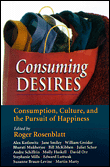In Walden, Henry David Thoreau wrote that “to maintain one’s self on this earth is not a hardship but a pastime, if we will live simply and wisely.” He warned his readers against an increasingly prevalent consumer culture in the United States — in 1854. Nearly 150 years later, Americans are, on average, working more hours and accruing more debt than ever before in order to achieve some bloated variation of the American dream. Some things never change.
Consuming Desires: Consumption, Culture, and the Pursuit of Happiness, a lively collection of essays edited by Roger Rosenblatt, examines the evolution of consumer culture in the United States, or, in less lofty terms, just why we Westerners think we need so much stuff. The book’s 14 contributors, an eclectic group, range from noted environmental author Bill McKibben to Pulitzer Prize-winning novelist Jane Smiley, from film theorist Molly Haskell to Rolling Stone columnist and writer William Greider.
Rather than merely moralizing about the virtues of living simply, the essayists delve into the reasons behind the rise of consumer culture, reasons far more complex than a booming economy. They also explore the possible consequences, both social and environmental, of a continuing trend of unadulterated consumption. The essays as a whole acknowledge the complications of criticizing consumer culture from within — after all, the book is itself a consumer product — and search for explanations as to why we in the U.S. maintain an outrageous standard of living while the majority of the world’s population exists in poverty. Though consumer culture is neither a new, nor even an exclusively American, phenomenon, it has nevertheless become synonymous with modern American culture in the eyes of the rest of the world, whether these eyes are filled with envy or disdain.
Is this excess the result of opportunity, consuming because we can, or is there an emotional or psychological need that consumers are attempting to satisfy? In the essay “Consuming for Love,” Edward N. Luttwak argues that consumption is now the central tenet of American culture. He compares modern American culture to cultures in which consumerism is less valued and searches for gaps in American society that might spur consumption. In the end, he links the rise of consumerism in the U.S. to the disintegration of extended families, communities, and the support networks they offer. David W. Orr, a professor of environmental studies at Oberlin College, follows a similar vein as he writes about the role isolation within communities plays in increased consumerism. His essay is centered around a concept he calls an economy and ecology of “connectedness,” which arises from strong communities and encourages both environmental and social responsibility.
In a different approach to the topic, Jane Smiley examines the consumption of human labor. As the United States expanded and developed during the 19th century, there was an abundance of land, but a shortage of workers both in industry and in the home, which spurred the invention of labor- and time-saving devices. Smiley traces the roots of the feminist movement to the thousands of domestic conveniences that revolutionized home life over the past century, drastically reducing the amount of time a woman needed to devote to housekeeping. But this progress also came at a high environmental cost. Smiley does not advocate a return to chamber pots, however. Rather, she suggests that a viable alternative to consumerism and the ecological deterioration it causes will arise in a more densely populated region of the world, where the relative scarcity of land and resources renders the American lifestyle both absurd and impossible. And whatever this alternative may be (Smiley does not specify), she believes it will eventually come to dominate the globe. “We may like it,” she writes. “And then again, we may not.”
In the book’s concluding (and perhaps best) essay, “Can’t Get That Extinction Crisis Out of My Mind,” Stephanie Mills writes:
Ever since the earliest city-states and theocracies were formed, the power elite have been the leading exponents of the joys of consumption, obtaining their luxuries and leisure by force majeure or by invoking the fear of God or the myths of divine right, profit sharing, or trickle-down. In order to support the kings, khans, pharaohs, emperors, thanes, lords, and chief executive officers in the manner to which these rulers had become accustomed, and to which they claimed to be entitled, the subject populace would exploit the land.
And the same cycle continues, Mills argues, on a global scale. To support the excessive, luxurious lifestyle of the privileged few, it is now necessary for millions to live not merely simply, but in squalor. The standard of living most residents of the U.S. enjoy is only possible through the exploitation of human and natural resources both in this country and around the globe.
While Rosenblatt doesn’t go so far as to include any essays proclaiming the virtues of consumption, each writer handles the subject quite differently. The book’s strength lies in the variety of approaches to consumer culture that it offers, arranged to show a logical progression through cause and effect in its examination of the topic. Overall, Consuming Desires is both interesting and entertaining — a worthwhile read.
The book’s bottom line? If one must consume, consume consciously. Self-evident, but far from simple.


